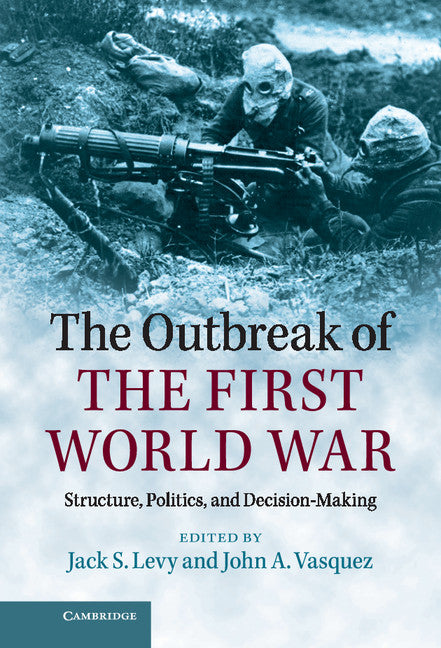Freshly Printed - allow 8 days lead
Couldn't load pickup availability
The Outbreak of the First World War
Structure, Politics, and Decision-Making
This volume brings together leading historians and international relations scholars to debate the causes of the First World War.
Jack S. Levy (Edited by), John A. Vasquez (Edited by)
9781107042452, Cambridge University Press
Hardback, published 3 April 2014
324 pages, 3 b/w illus. 3 tables
22.9 x 15.2 x 1.9 cm, 0.6 kg
'This collection of essays by historians and political scientists from across the English-speaking world examine various aspects of the political and diplomatic institutions and decisions that had immediate influence on the outbreak of the Great War. … The essays are all well-documented and thoughtful … An excellent work, this is primarily for the serious scholar of the Great War and of decision-making in times of crisis.' NYMAS Review
The First World War had profound consequences both for the evolution of the international system and for domestic political systems. How and why did the war start? Offering a unique interdisciplinary perspective, this volume brings together a distinguished group of diplomatic historians and international relations scholars to debate the causes of the war. Organized around several theoretically based questions, it shows how power, alliances, historical rivalries, militarism, nationalism, public opinion, internal politics, and powerful personalities shaped decision-making in each of the major countries in the lead up to war. The emphasis on the interplay of theory and history is a significant contribution to the dialogue between historians and political scientists, and will contribute to a better understanding of the war in both disciplines.
Part I. Overview of Debates about the Causes of the First World War: 1. Introduction: historians, political scientists, and the causes of the First World War Jack S. Levy and John A. Vasquez
2. July 1914 revisited and revised: the erosion of the German paradigm Samuel R. Williamson, Jr
Part II. Structure and Agency: 3. Strategic rivalries and complex causality in 1914 Karen Rasler and William R. Thompson
4. 'A formidable factor in European politics': views of Russia in 1914 T. G. Otte
Part III. The Question of Preventive War: 5. Restraints on preventive war before 1914 William Mulligan
6. The sources of preventive logic in German decision-making in 1914 Jack S. Levy
7. International relations theory and the three great puzzles of the First World War Dale C. Copeland
8. Was the First World War a preventive war? Concepts, criteria, and evidence John A. Vasquez
Part IV. The Role of the Other Powers: 9. War accepted but unsought: Russia's growing militancy and the July Crisis, 1914 Ronald P. Bobroff
10. France's unreadiness for war in 1914 and its implications for French decision-making in the July Crisis J. F. V. Keiger.
Subject Areas: International relations [JPS], First World War [HBWN], Military history [HBW]


